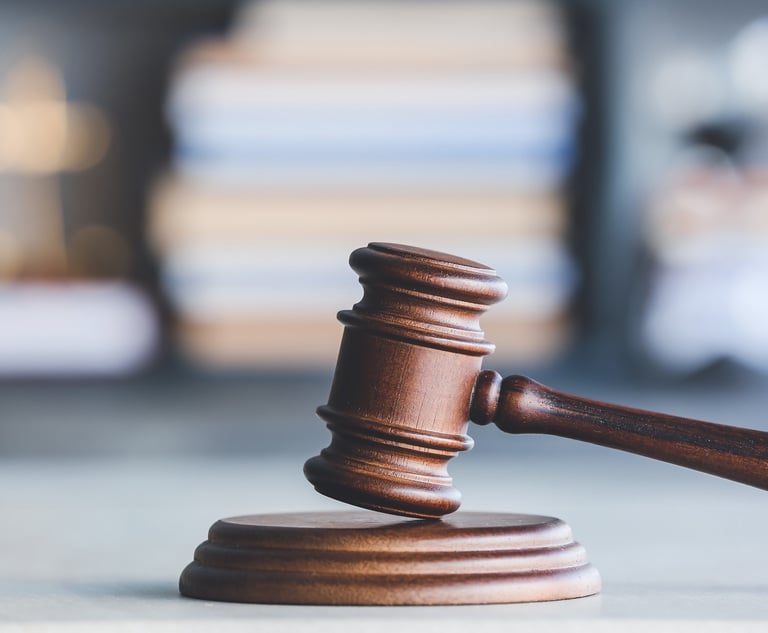With Trials Curtailed by Coronavirus, Some Litigators Worried About Lost Revenue
"We can't go on indefinitely without bringing in new business or settling cases," one litigator said.
March 19, 2020 at 05:48 PM
6 minute read
 Illustration of the novel coronavirus
Illustration of the novel coronavirus
In the first week after most New Jersey court proceedings were shut down to reduce transmission of the coronavirus, New Jersey litigators were adjusting to a slower pace while also worrying about reduced revenue and wondering how long this new routine will last.
In the Superior Court of New Jersey, and in municipal court and landlord-tenant court, proceedings were postponed to varying degrees as the judiciary seeks to move to video and telephone conferences in order to minimize human contact to limit the spread of COVID-19. And in federal courts in Newark, Trenton and Camden, jury trials were postponed and restrictions were imposed on who can enter court buildings.
For Kenneth Thyne, court proceedings haven't quite come to a halt, since his schedule this week included a case management conference and an oral argument, both conducted by telephone. But his practice is slowing down.
The legal malpractice lawyer with Roper & Thyne continues to go to his office every day, since the activities of his three children make it hard for him to concentrate when working from home.
Thyne is still practicing his own brand of social distancing—he leaves his house, drives to the office and goes to work without coming near any other people. He avoids direct contact with his secretary, and even talks to his law partner in adjoining offices by phone.
"I keep saying to people, it feels like a Sunday. The traffic is nonexistent," he said.
Thyne said he spent four days in court last week picking a jury for a breach-of-contract case in Passaic County until a shortage of prospective jurors caused the judge to abort the trial and reschedule it for April. One prospective juror told Thyne he would rely on public transportation to get to the courthouse, but was reluctant to ride a public bus because of the risk of contamination, he said.
Thyne worries the lack of trials will mean fewer settlements, since it's the prospect of a looming trial that often makes a defendant willing to cut a deal. And his law partner had a mediation canceled this week due to the coronavirus, he said.
"We can't go on indefinitely without bringing in new business or settling cases," Thyne said.
Litigator and divorce lawyer Edward Zohn of Zohn & Zohn in Warren has heard from numerous attorneys struggling to adjust to the new set of challenges as he is chairman of the New Jersey State Bar Association's Solo and Small Firm Section. That group received an "unprecedented response" from more than 100 people to a seminar held Thursday on how to navigate solo practices and small firms through the coronavirus crisis.
Lawyers who practice alone or in small groups are more vulnerable to an external disruption because they don't have the same line of credit that many larger firms rely on to get through tough times, said Zohn. Many have only minimal amounts of cash tucked away in reserve, and are faced with decisions about whether to lay off support staff, he said. Some litigators are coping with this while also struggling to keep their children occupied because schools are closed.
In addition, many lawyers practicing alone or in small firms are unable to work remotely during the current crisis because they never invested in technological advances such as voice over internet protocol and cloud storage systems. Those who have installed the newer office technology "are better situated to weather this—they can work from anywhere. Those who have not are floundering," said Zohn.
And just as they are forced to cope with additional stressors, many lawyers find themselves cut off from interaction with their peers in the office and in court, Zohn said.
"It makes people anxious from a monetary perspective, from a mental health perspective, from a cabin fever perspective. Attorneys, by nature, are social people," Zohn said.
"My colleagues are all very anxious about what the next few weeks will bring. The biggest problem we're all having here is we're all isolated—we have to create our own networks. So it's a socialization issue, too," he said.
For Jonathan Lomurro, a medical malpractice lawyer at Lomurro, Munson, Comer, Brown & Schottland in Freehold, court shutdowns have allowed him to catch up on other legal work. In med-mal cases, depositions of health care workers are traditionally taken at hospitals to make things easier for doctors and nurses. But coronavirus precautions have brought about the cancellation of most such events.
"I hope the courts are a little lenient on the discovery deadlines. We've already seen kindness from adversaries—everybody understands we are adversaries but don't have to be adversarial," Lomurro said.
Lomurro expressed concern that clients who are subject to the Tort Claims Act might not be able to meet its strict time deadlines, and he hopes courts will be accommodating.
Working from home has also given him an opportunity to have lunch and afternoon walks with his daughters, ages 10, 8 and 6, Lomurro said, although he worries they are stressed out by staying at home.
Allan Marain, a criminal defense lawyer in New Brunswick, said courts are adjourning all his cases, and the usual calls he gets from prosecutors and courts about pending cases have stopped. What's more, he's seen a dearth of new cases coming in, which he's at a loss to explain.
"I am taking advantage of the situation to get work done that has been on the back burner for quite a while. I'm remaining productive," he said.
While the pace of his work as slowed down considerably, Marain expects things will be hectic again when courts get back to their usual schedules and his cases will need to get caught up.
"I've been around a long time—I think I'm able to manage what comes along," he said.
This content has been archived. It is available through our partners, LexisNexis® and Bloomberg Law.
To view this content, please continue to their sites.
Not a Lexis Subscriber?
Subscribe Now
Not a Bloomberg Law Subscriber?
Subscribe Now
NOT FOR REPRINT
© 2025 ALM Global, LLC, All Rights Reserved. Request academic re-use from www.copyright.com. All other uses, submit a request to [email protected]. For more information visit Asset & Logo Licensing.
You Might Like
View All
Law Firms Look to Gen Z for AI Skills, as 'Data Becomes the Oil of Legal'



Trending Stories
- 1Troutman Pepper, Claiming Ex-Associate's Firing Was Performance Related, Seeks Summary Judgment in Discrimination Suit
- 2Law Firm Fails to Get Punitive Damages From Ex-Client
- 3Over 700 Residents Near 2023 Derailment Sue Norfolk for More Damages
- 4Decision of the Day: Judge Sanctions Attorney for 'Frivolously' Claiming All Nine Personal Injury Categories in Motor Vehicle Case
- 5Second Judge Blocks Trump Federal Funding Freeze
Who Got The Work
J. Brugh Lower of Gibbons has entered an appearance for industrial equipment supplier Devco Corporation in a pending trademark infringement lawsuit. The suit, accusing the defendant of selling knock-off Graco products, was filed Dec. 18 in New Jersey District Court by Rivkin Radler on behalf of Graco Inc. and Graco Minnesota. The case, assigned to U.S. District Judge Zahid N. Quraishi, is 3:24-cv-11294, Graco Inc. et al v. Devco Corporation.
Who Got The Work
Rebecca Maller-Stein and Kent A. Yalowitz of Arnold & Porter Kaye Scholer have entered their appearances for Hanaco Venture Capital and its executives, Lior Prosor and David Frankel, in a pending securities lawsuit. The action, filed on Dec. 24 in New York Southern District Court by Zell, Aron & Co. on behalf of Goldeneye Advisors, accuses the defendants of negligently and fraudulently managing the plaintiff's $1 million investment. The case, assigned to U.S. District Judge Vernon S. Broderick, is 1:24-cv-09918, Goldeneye Advisors, LLC v. Hanaco Venture Capital, Ltd. et al.
Who Got The Work
Attorneys from A&O Shearman has stepped in as defense counsel for Toronto-Dominion Bank and other defendants in a pending securities class action. The suit, filed Dec. 11 in New York Southern District Court by Bleichmar Fonti & Auld, accuses the defendants of concealing the bank's 'pervasive' deficiencies in regards to its compliance with the Bank Secrecy Act and the quality of its anti-money laundering controls. The case, assigned to U.S. District Judge Arun Subramanian, is 1:24-cv-09445, Gonzalez v. The Toronto-Dominion Bank et al.
Who Got The Work
Crown Castle International, a Pennsylvania company providing shared communications infrastructure, has turned to Luke D. Wolf of Gordon Rees Scully Mansukhani to fend off a pending breach-of-contract lawsuit. The court action, filed Nov. 25 in Michigan Eastern District Court by Hooper Hathaway PC on behalf of The Town Residences LLC, accuses Crown Castle of failing to transfer approximately $30,000 in utility payments from T-Mobile in breach of a roof-top lease and assignment agreement. The case, assigned to U.S. District Judge Susan K. Declercq, is 2:24-cv-13131, The Town Residences LLC v. T-Mobile US, Inc. et al.
Who Got The Work
Wilfred P. Coronato and Daniel M. Schwartz of McCarter & English have stepped in as defense counsel to Electrolux Home Products Inc. in a pending product liability lawsuit. The court action, filed Nov. 26 in New York Eastern District Court by Poulos Lopiccolo PC and Nagel Rice LLP on behalf of David Stern, alleges that the defendant's refrigerators’ drawers and shelving repeatedly break and fall apart within months after purchase. The case, assigned to U.S. District Judge Joan M. Azrack, is 2:24-cv-08204, Stern v. Electrolux Home Products, Inc.
Featured Firms
Law Offices of Gary Martin Hays & Associates, P.C.
(470) 294-1674
Law Offices of Mark E. Salomone
(857) 444-6468
Smith & Hassler
(713) 739-1250






